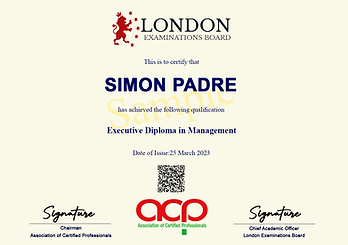PROGRAMME AIMS
This Executive Diploma in Management is designed to provide a fundamental understanding of practices in Business Management. It is designed to equip those who are keen to take up employment in Management within the business sector. Those who are keen to further their education can progress on to either the Higher Diploma in Business Management or gain entry and acceptance into Year 2 of a Bachelor’s degree.
PROGRAMME STRUCTURE
The Executive Diploma in Retail Management comprises of three modules. Executive Diploma in Retail Management is a professional diploma delivered in a manner that gives you the flexibility to learn at a time and place that suits your personal and work life. You can embark immediately on an Executive Diploma in Retail Management knowing you can fit it into your schedule.
3 core modules 60 credits
- Organizational Behavior – 20 Credits
- Cost Management – 20 Credits
- Analyzing Your Business – 20 Credits
DELIVERY MODE
Mode A: Blended Learning mode
Available at selected Approved Learning Centres where classes are held plus learners are given a complete set of learning materials to facilitate independent study which can be accessed through our designated Learning Portal.
For each module we recommend that Approved Learning Centres provide between 6 and 12 hours of lectures/tutorials and that you spend at least 12 hours learning online.
Mode B: Fully Online mode
Learners are given a complete set of learning materials to facilitate independent study which can be accessed through our designated Learning Portal. For each module, we recommend at least 24 hours of online learning.
ADMISSION CRITERIA
An applicant may be admitted on the basis of evidence to suggest that he or she will be able to fulfill and benefit from the objectives of the programme and achieve the standard required for the award.
Summary of Entry Requirements
No prior knowledge is required. Applicants should normally be at least 16 years old and preferably with the following:
- Level 3 (QCF/RQF) Certificate;
- 4 GCSEs at grade C or above; or
- Working adults.
Advanced Standing / Exemptions / Credits Transfer (APL)
Consideration for the above for learners admitted onto the programme may be considered either at the beginning of a programme, or beyond the beginning of a programme, through an assessment of that learner’s prior learning, whether certificated or un-certificated. The process for making such a decision is known as the Accreditation of Prior Learning (APL) is a matter of academic judgment exercised by the appointed panel considering applications and approvals of APL. Where cohorts of learners are to be admitted with advanced standing on a regular basis, the arrangement should be subject to an Academic Progression Agreement.
ASSESSMENT STRUCTURE
Comprehensive Multiple Choice Questions (“MCQs”)
The mode of assessment is a carefully designed MCQs consisting of 50 MCQs to be taken either online or in a proctored paper-based final examination at approved centres. The duration of this final assessment will be 1.5 hours. The MCQ will serve to validate the attainment of broad understanding and application of knowledge by learners is related to the intended learning outcomes.
UNIT SPECIFICATION
Participants will be awarded an Executive Diploma in Management upon completion of the 3 Modules in Organisational Behaviour, Cost Management and Analysing Your Business.
1. Organisational Behaviour
Learning Outcomes
On completion of this Module learners will be able to:
- Analyze the effect to psychological and social process on process on individual and group behavior.
- Demonstrate the ability to incorporate insights of various influential theories of management and Organizational behavior in work situations.
- Examine and analyse the cause, consequences, and implication of Organizational decisions and actions to bring about improvements in the organization.
Topics covered include:
- Managing in rapidly changing world
- Challenging and Opportunities for Organizational Behavior
- Personality, Principles, and Ethics
- The importance of Learning
- Motivation
- Stress Management
- Teamwork
- Leadership
- Power and Politics
- Conflict and Negotiation
- Work Design and Technology
- Organizational Culture
- Organizational Change
2. Cost Management
Learning Outcomes
On completion of this Module learners will be able to:
- Demonstrate the ability to identify the different type of costs and cost systems in business organisation.
- Analyse cost behaviours and implications to businesses.
- Use various cost control techniques to manage and control costs in businesses.
Topics covered include:
- Introduction to cost management
- Basic cost management concepts
- Cost behavior
- Activity – based costing
- Product and service costing – A process systems approach
- Product and service costing – Job order system
- Allocating costs of support department and joint products
- Standard costing – A functional based control function
- Budgeting for planning and control
3. Analysing Your Business
Learning Outcomes
On completion of this Module learners will be able to:
- Demonstrate the ability to identify the 8 essentials management areas critical for business organisations.
- Analyse the key areas which requires management action in order to improve organizational performance.
Topics covered include:
- Introducing Eight Management essentials
- Transforming the business
- Vision and planning
- Commitment to quality standards
- Leadership
- Decision-making
- Finance
- Marketing
- Communication
- Information Technology

